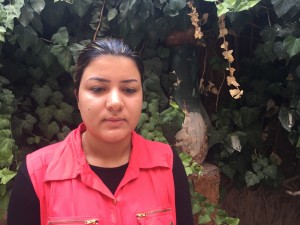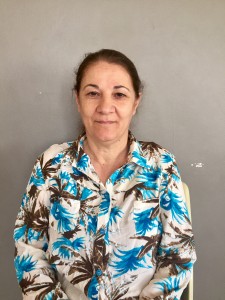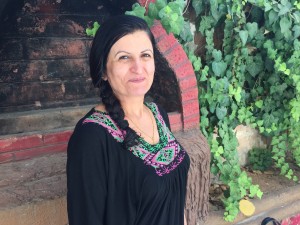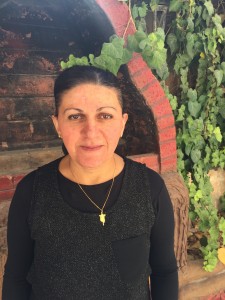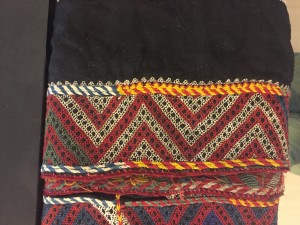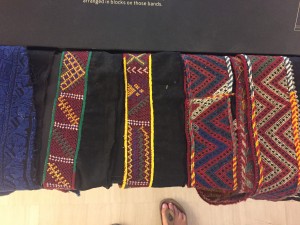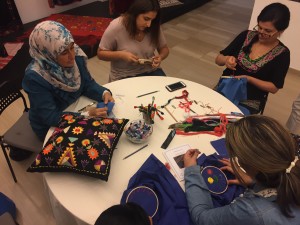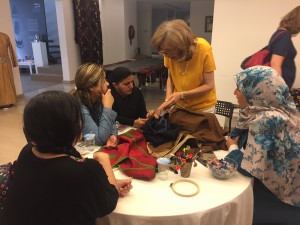Anyone who knows me personally knows that I have no hand-eye coordination. Getting me to catch anything, play the piano, or even park a car in between the lines is a struggle. So, you can understand my apprehension when the embroidery leaders wanted me to learn new embroidery stitches with them at Tiraz. For the first two days, I resisted. I made excuse after excuse because I was certain I would be absolutely terrible. Turns out, I’m not very good… but not as bad as anticipated.
Ameera, Hiba, Ashwaq, and Huda are all Iraqi refugees who live in Amman. Some of them, like Huda, have been at CRP for a long time. Huda says CRP is like her second home; she feels protective of the space that gave her a community and hope. She raves about the English classes, the women’s empowerment programs, and the friends she’s made. For Ashwaq and Hiba, Huda and Ameera couldn’t be better resources. They are leaders in the Hope Workshop already and are loved by the entire CRP community.
These four women have come together to learn new embroidery skills and improve upon skills they already have. After an intensive training at Tiraz, they will go on to teach 20 women what they have learned. These 20 women will be given the opportunity to put their stories into art, creating a square that describes their lives as refugee women. This new AP-sponsored embroidery group includes both Iraqi and Syrian women from Christian, Sabaean, and Muslim backgrounds. They will come together like the other groups before them to find community and comfort.
After their advocacy squares are turned into a quilt, they will begin working toward the goal of selling embroidered products in Jordan and abroad.
When thinking about this embroidery workshop, I wanted to include stitches that were culturally relevant to the women. When speaking with the Tiraz employees, I discovered the Raghme stitch, the traditional Iraqi stitch, and couching.
Our first few days at Tiraz were spent on Raghme, which is a traditional stitch from southern Syria. This stitch uses negative space to create a pattern and is incredibly rare today. Most women who embroider in the Middle East today do a Palestinian cross stitch and the Raghme technique is dying out. Preserving this tradition and having a unique product on the market were priorities when deciding to work on Raghme. This stitch is hard work. The women (all of whom are super skilled at sewing, crocheting, embroidery, or all of the above) all tired themselves out working on this stitch. They enjoyed the challenge, however, and are ready to try it again on Tuesday.
All of the women were already familiar with the Iraqi stitch, which is what will be used to create the advocacy squares. The Iraqi stitch is a creative one; the artist designs what he or she will embroider and fills in the designs with color. This stitch is very versatile and can be used to tell stories or to adorn dresses, pillows, or blankets. When we began the Iraqi stitch, the women barely needed direction; they just began working. I was roped into learning this one and was initially really nervous. However, I loved seeing the examples of stunning Iraqi workmanship and hearing the women’s stories about their homeland. My Iraqi stitch didn’t look quite as good as the others’, but I found embroidery very therapeutic (similar to adult coloring books but better!). Some of the women got teary remembering their homes, but I felt that working on the Iraqi stitch gave them some comfort.
We were never intending to work on couching, but the women were intrigued by it. Couching was often used on men’s clothing in Iraq. It was a much thinner thread dipped into gold and sewn onto the clothing in ornate patterns. Layla, an Iraqi refugee herself, brought beautiful examples of this couching and the women were ravished. We decided that Wednesday will be spent learning this wonderful technique. I’m sad that I won’t be there to see the women work on couching, but I am promised photos.
Overall, I am so happy to have had the opportunity to watch these four women grow together and gain confidence to teach the rest of the group. In these few days of training they have laughed and cried and I have been honored to be a part of their little group. Embroidery is hard, but I trust these women to pass on their skills and create beautiful works of art.
Posted By Reina Sultan (Jordan)
Posted Aug 6th, 2017


